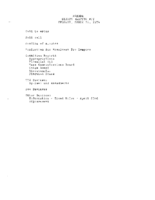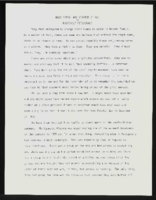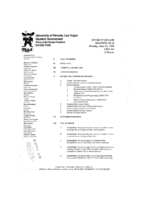Search the Special Collections and Archives Portal
Search Results
Arlene Blut oral history interview
Identifier
Abstract
Oral history interview with Arlene Blut conducted by Barbara Tabach on May 28, 2015 for the Southern Nevada Jewish Heritage Project. Blut discusses her involvement in local and national arts, being an actor and promoter/director of theater events, and recalls her experiences in Las Vegas, Nevada’s Jewish community.
Archival Collection
Clare Woodbury oral history interview
Identifier
Abstract
Oral history interview with Doctor Clare Woodbury conducted by Ralph Roske on September 12, 1974 for the Ralph Roske Oral History Project on Early Las Vegas. Woodbury discusses education and medicine as well as sharing his experiences in the medical field in Las Vegas, Nevada.
Archival Collection
Judy Jetter oral history interview
Identifier
Abstract
Oral history interview with Judy Jetter conducted by Lisa Gioia-Acres on September 10, 2008 for the All That Jazz Oral History Project. Jetter discusses being mentored by Woody Herman and others about the art of jazz. She also talks about some jazz musicians in Las Vegas, Nevada, including Gus Mancuso, the Bootlegger, Terri James, and Jobell.
Archival Collection
Beth Molasky oral history interview
Identifier
Abstract
Oral history interview with Beth Molasky conducted by David Schwartz on June 06, 2014 for the Southern Nevada Jewish Heritage Project. Molasky discusses her childhood experiences in Las Vegas, Nevada, especially as a member of the Jewish community. She also reflects on changes that influenced her children’s upbringing in the city.
Archival Collection

University of Nevada, Las Vegas (UNLV) 31st commencement program
Date
Archival Collection
Description
Commencement program from University of Nevada, Las Vegas Commencement Programs and Graduation Lists (UA-00115).
Text

Meeting minutes for Consolidated Student Senate, University of Nevada, Las Vegas, July 21, 2003
Date
Archival Collection
Description
Text
Audio clip from interview with Milton I. Schwartz by Claytee White, May 4, 2004
Date
Archival Collection
Description
Part of an interview with Milton I. Schwartz on May 4, 2004. In this clip, Schwartz discusses his life after the military and working in Las Vegas.
Sound

Meeting minutes for Consolidated Student Senate, University of Nevada, Las Vegas, March 26, 1974
Date
Archival Collection
Description
Text

"Rosa Parks: Who Started It All": article draft by Roosevelt Fitzgerald
Date
Archival Collection
Description
From the Roosevelt Fitzgerald Professional Papers (MS-01082) -- Drafts for the Las Vegas Sentinel Voice file. On Rosa Parks and the Civil Rights Movement.
Text

Meeting minutes for Consolidated Student Senate University of Nevada, Las Vegas, June 21, 1999
Date
Archival Collection
Description
Text
